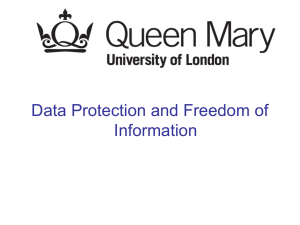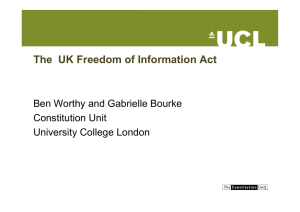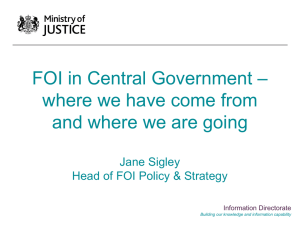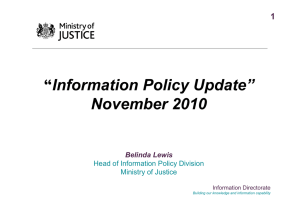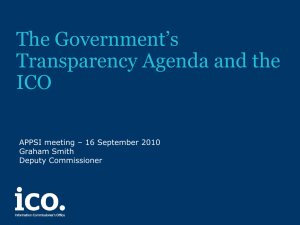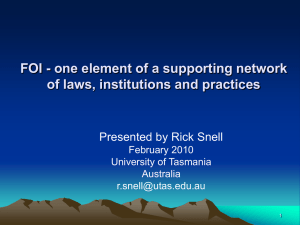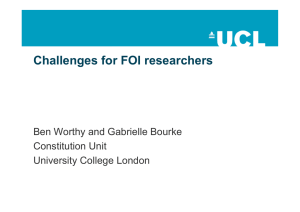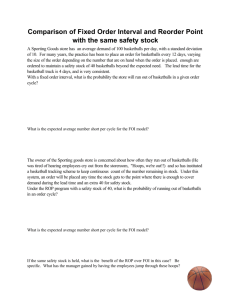Research and the Data Protection and Freedom of Information Acts
advertisement
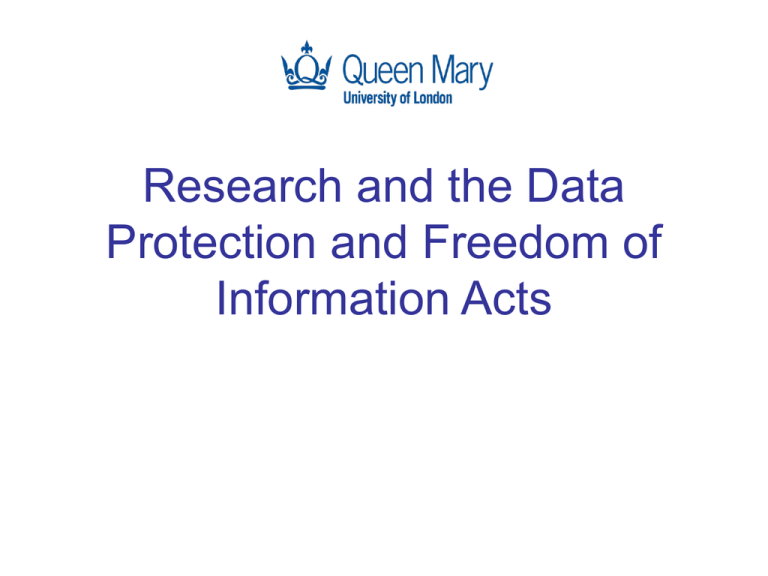
Research and the Data Protection and Freedom of Information Acts Data Protection Act 1998 and Freedom of Information Act 2000 • DPA concerns personal data i.e. information from which a living individual can be identified • FOI concerns all information – in any format – “held” by the institution even if it was created before 01/01/2005 when the Act came in to force Research and the DPA • Under Section 33 there are specific provisions in the Data Protection Act 1998 for the use of personal data in research • Before using personal data in research, approval should be sought from the College’s Research Ethics Committee as part of the application process • When collecting data the specific purpose(s) for doing so must be stated • Researchers should adopt a system of anonymous coding (pseudo-anonymisation) as the identity of data subjects must not be given away without consent • Appropriate security should be in place and note that there may be restrictions on where data can be stored Research and the DPA • All personal data must be held securely against loss, damage or unauthorised access • Personal data must not be transferred out of the EEA unless that country has adequate protection – the USA, for example, is deemed not to. This will include storing data on servers (e.g. with cloud providers) Research and the DPA • Personal data used in research: – may be used for purposes beyond the originally stated purpose ( it’s good practice to inform data subjects if this happens) – must not be processed in such a way that substantial damage or substantial distress is, or is likely to be, caused to any data subject – can be retained indefinitely – is exempt from SARs (the right of access) - as long as published research does not identify individuals Research and FOI (and EIR) • Be aware that research data and final reports may be subject to FOI requests • If a request is received it must be notified to the Records & Information Compliance Manager • Similar regime – Environmental Information Regulations 2004 – applied to any information connected to environment, from soil to emissions FOI Exemptions • Possible exemption under s.22 (information intended for future publication) though must be a genuine intention to publish what has been requested • Possible exemption under s.40 (personal data) – where individuals could be identified and data has only been provided for research purposes • Possible exemption under s.41 (information provided in confidence) only if an agreement specifies that the data is property of a private funder and is being held in confidence • Other relevant sections: s.12 (exceeds appropriate limit), s.14 (vexatious or repeated), s.43 (commercial interests)* Research and FOI • Providing a copy of information for FOI purposes does not mean that an individual or organisation has waived their intellectual property or moral rights* • Deadline to respond to requests is 20 working days, therefore you should make arrangements to ensure that information can be retrieved in this time even if you are away • Insert clauses in research contracts about ownership, copyright and FOI Animal testing • It is likely that exemptions will be able to be applied to prevent the disclosure of at least some information about animal testing under FOI • For example s.40 exempts personal data such as researchers’ names being disclosed • S.38 exempts information which may endanger the physical or mental health or safety of any individual Any questions? Contact the Records & Information Compliance Manager Tel: (13) 7596 E-mail: p.smallcombe@qmul.ac.uk See also: Data Protection Policy



